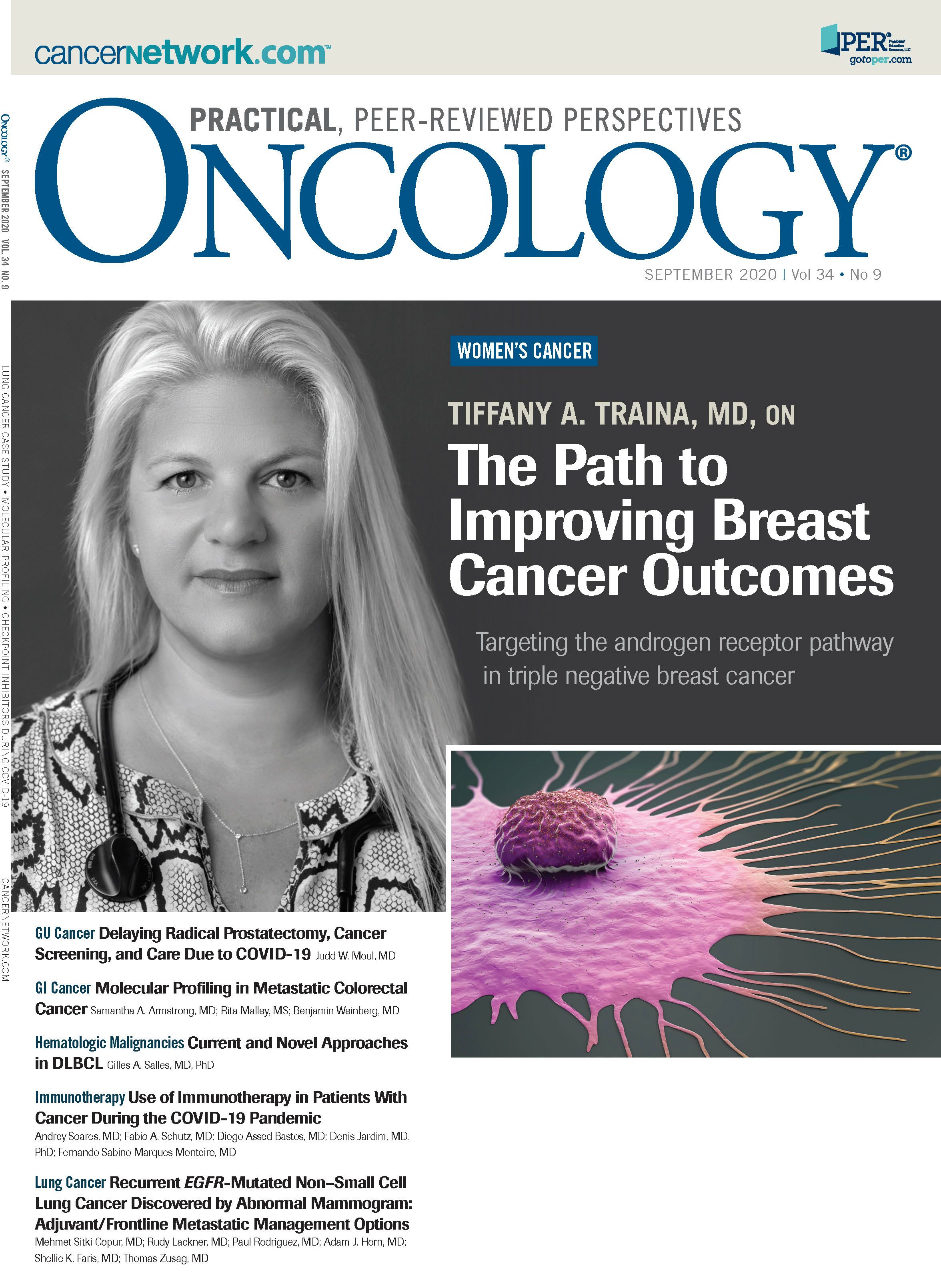Screening for Phase 1 Clinical Trials: An Opportunity to Evaluate Psychological States and Re-educate Patients on Prognosis?
ABSTRACT: Disease progression or recurrence after a period of remission can be a challenging event for individuals seeking cancer treatment. Those referred for possible phase 1 trial enrollment are often motivated to participate in these studies with hope for a cure despite approximately 5% response rates in this setting. Addressing such commonly held misunderstandings during the initial evaluation for phase 1 trial eligibility could provide a valuable opportunity to improve physician communication by identifying signs of distress or psychiatric conditions, addressing underlying psychological biases, and encouraging adaptive coping strategies.
Sen is associate director, Drug Development Unit, Sarah Cannon Research Institute at HealthONE in Denver, Colorado.

Moreland is a hospitalist with Colorado Permanente Medical Group, Medical Center of Aurora in Aurora, Colorado.

Introduction
The primary objective of phase 1 clinical trials is to determine the maximally tolerated dose of a drug under investigation.1 While historically only ~5% of subjects enrolled in phase 1 trials demonstrate a radiographic response to the drug of interest,1-4 past findings have suggested that individuals are often not always aware of these data. Additionally, while the treatment of metastatic disease is done with palliative intent, to attempt to improve quality or quantity of life, many individuals enrolling in these trials have previously cited cure as a common motivation for participation.1-8 Past findings suggest that this discrepancy may be a result of inadequate physician communication9,10 and psychological defense mechanisms employed by those facing serious illness.11-13 Improving physician communication during the initial stages of phase 1 trial enrollment would not only allow for an increased awareness of the significant psychosocial impact of cancer on an individual but would also provide an opportunity to address prognostic understanding.
The Psychosocial Impact of Cancer
A diagnosis of cancer poses a unique set of challenges that encompass not only physical manifestations and adverse effects of treatment, but also raises a variety of psychosocial issues. The National Comprehensive Cancer Network has developed guidelines for the identification and management of distress, defined as “a multifactorial, unpleasant experience of a psychological (ie, cognitive, behavioral, emotional), social, spiritual, and/or physical nature that may interfere with one’s ability to cope effectively with cancer, its physical symptoms, and its treatment.”14 An estimated 20% to 52% of individuals with cancer struggle with distress,15-17 and about one-third meet clinical criteria for depression.18
Negative psychological states not only impact overall quality of life in those with cancer, but may also impact overall health. In a study of 151 individuals with metastatic non–small cell lung cancer, 14% were found to meet criteria for major depression, which was correlated with worse survival.19 A separate study of 125 women with metastatic breast cancer participating in expressive group therapy showed that those with improving scores on the Center for Epidemiologic Studies-Depression Scale survived 53.6 months whereas women with worsening scores survived 25.1 months.20 These findings demonstrate the prognostic value in screening and managing negative psychological states in those with cancer.
In phase 1 trial participants, the presence of hope has been shown to have a positive impact on psychological well-being. An exploratory cross-sectional study of 135 patients with incurable cancer who were deliberating participation in a phase 1 trial showed that the presence of hope was associated with higher rates of optimism and improved quality of life.21 The results of other studies support these associations: In one, 179 phase 1 trial subjects showed positive correlations between hopefulness and coping, and a negative association between hope and awareness of prognosis.22 A study of 24 patients with metastatic renal cell carcinoma and 22 patients with metastatic melanoma demonstrated a negative correlation between treatment-specific optimism and depression.23 For physicians, promoting a sense of hope while communicating realistic expectations for prognosis can be challenging and could potentially have significant ramifications if this balance is not met.
Improving Physician Communication
Incomplete physician communication during the enrollment process has been identified as a potential source of unrealistic expectations with regard to phase 1 trials.9,10 Multiple studies have demonstrated a shared desire for improved communication by both trial participants and physicians. In a study of 328 phase 1 trial participants, 28% reported that their physician did not fully address the potential impact that a phase 1 trial could have on quality of life.9 A separate study of 37 phase 1 trial subjects stated that overall, their expectation for tumor response and more frequent physician communication was not met during the study.24 Physicians participating in a survey exploring the barriers to effective communication during phase 1 trial enrollment report time constraints and the trial participant’s hesitance to express concerns as commonly encountered challenges.25
A recent article by McFarland et al explored the unique challenges involved in confronting individuals with cancer and provided examples showing how the dynamic roles of the oncologist can be used to help manage these obstacles. For instance, facilitating trust can allow for effective delivery of news that carries uncertainty about the future. Likewise, promoting stability within the oncologist–patient relationship can help individuals cope with loss; and finally, taking time to emphasize individual accomplishments can help define meaning while identifying overall goals.26 The importance of open communication is relevant to those considering phase 1 trial enrollment and can help inform an individual’s decision as to whether or not to participate. A survey of phase 1 trial subjects showed that individuals who did not initially express their thoughts regarding trial enrollment and were later able to discuss their fears and concerns experienced increased autonomy with respect to making a decision about enrollment.27
While oncologists must often discuss difficult information regarding prognosis and unfavorable outcomes, oncology fellowships have not traditionally provided dedicated training for navigating these complex conversations.28 Prior work has demonstrated that effective physician communication leads to better identification of patient preferences regarding treatment, allowing for more individualized care.29 Several programs have incorporated dedicated communication training into their curriculums. For instance, a program developed by MD Anderson Cancer Center held monthly sessions that used peer-based learning and roleplaying. These sessions provided a framework for how to approach difficult conversations, putting emphasis on using communication skills that incorporate open-ended questions to explore what the patient understands about their condition, create space through listening without interruption, encourage empathy as a response to patient emotion, and promote self-reflection after the encounter. The fellows who completed the program found it to be advantageous, according to anonymous responses to surveys; in addition, the program was successfully integrated into a busy fellowship curriculum.30 While difficult conversations are commonly encountered in oncology practice, effective physician communication skills can transform them into opportunities to better understand patient preferences and underscore the importance of communication training in oncology fellowship.
Understanding Defense Mechanisms and Coping Strategies When Facing Severe Illness
In the face of serious illness, patients often employ psychological defense mechanisms like therapeutic misconception and unrealistic optimism. Therapeutic misconception is the belief on the part of those participating in clinical trials that the study is intended for clinical benefit rather than research purposes,11 while unrealistic optimism describes a subject’s belief that they are more likely to experience clinical benefit from a clinical trial compared with other participants, despite evidence to the contrary.13 While these biases hypothetically provide some degree of psychological protection, they may unfortunately lead to a misunderstanding regarding the purpose of a phase 1 trial and could prevent an individual from having a realistic understanding of their prognosis. Physicians may benefit from looking out for and recognizing the use of defense mechanisms in those undergoing evaluation for possible clinical trial enrollment in the interest of setting realistic expectations.
There has been extensive investigation into the types of coping strategies employed by individuals with cancer. These strategies are often characterized by the extent to which an individual perceives that they have control over their environment. For instance, if a patient perceives themselves to have a higher level of control, this typically leads to problem-based coping, where attempts are made to change external factors that are preventing the patient from attaining their goals. Conversely, patients use emotionally based coping mechanisms when they perceive a loss of control; then, they modify their personal goals to better fit their situation.31 In individuals with terminal cancer, meaning-based coping has been shown to have positive clinical outcomes, including lower levels of depression and improved quality of life.32 This type of coping involves releasing previously held but now unrealistic objectives in the interest of pursuing goals that are more in line with one’s situation. 31 Encouraging this type of coping strategy in individuals who are considering phase 1 trial enrollment could help to both foster a realistic understanding of their prognosis and benefits of the trial, while also promoting hope and encouragement in embracing goals that are more in line with their clinical situation.
Promising Behavioral Therapies for Individuals With Terminal Cancer
Cognitive behavioral therapy (CBT), a commonly used psychological intervention that is beneficial for a variety of conditions, more recently has been incorporated into distress management for cancer.14 While time and transportation may be limiting factors for office-based CBT in individuals with incurable cancer, a randomized controlled trial from 2019 studied the effect of a web-based CBT application in this population and showed a significant decrease in the rates of depression and anxiety.33 These findings support the concept that incorporating CBT into clinical practice is feasible, increasing the accessibility of CBT to individuals with progressive cancer who may not be able to tolerate multiple office visits.
Based in CBT principles is Acceptance and Commitment Therapy (ACT), a novel technique that encourages individuals to embrace their experience with cancer in order to define the values most important to them, in the interest of creating realistic, actionable goals.34 Studies investigating the effects of ACT therapy in those with cancer have shown promising results. For instance, a randomized controlled trial comparing ACT with CBT in individuals with ovarian cancer demonstrated improved mood and quality of life despite disease progression in the ACT arm.35 In several preliminary studies, ACT has been shown to improve depression and psychological distress and is associated with increased quality of life.36 Ongoing clinical trials investigating the effectiveness of ACT include CanACT, in terminally ill individuals with cancer,37 and BEACHes, in those transitioning to palliative care.38
Conclusions
The presence of hope in phase 1 trial participants is correlated with optimism and improved quality of life.21 Not surprisingly, however, there exists an inverse relationship between hope and awareness of prognosis in this population.22 This dichotomy often places physicians in the difficult position of having to communicate a poor prognosis to a patient while attempting to preserve their overall psychological well-being. Effective physician communication can maintain this balance through skills that allow for individual patient preferences and concerns to be heard, while also providing the clinician with the opportunity to identify negative psychological states and poor coping strategies. Recognizing individuals who are struggling with distress or coping could lead to earlier referrals to behavioral therapies, which have been shown to be effective in decreasing depression and negative psychological states.37 While only a small portion of individuals enrolled in phase 1 clinical trials derive direct clinical benefit from the drug under investigation, the process of deliberating trial enrollment could provide a valuable opportunity to identify negative psychological states and revisit overall goals of care.
Financial Disclosure: The authors have no significant financial interest in or other relationship with the manufacturer of any product or provider of any service mentioned in this article.
REFERENCES
- Mahipal A, Nguyen D. Risks and benefits of phase 1 clinical trial participation. Cancer Control. 2014;21(3):193-199. doi:10.1177/107327481402100303
- Godskesen T, Nygren P, Nordin K, et al. Phase 1 clinical trials in end-stage cancer: patient understanding of trial premises and motives for participation. Support Care Cancer. 2013;21(11):3137-3142. doi:10.1007/s00520-013-1891-7
- Schutta KM, Burnett CB. Factors that influence a patient’s decision to participate in a phase I cancer clinical trial. Oncol Nurs Forum. 2000;27(9):1435-1438.
- Catt S, Langridge C, Fallowfield L, et al. Reasons given by patients for participating, or not, in phase 1 cancer trials. Eur J Cancer. 2011;47(10):1490-1497. doi:10.1016/j.ejca.2011.02.020
- Estlin EJ, Cotterill S, Pratt CB, et al. Phase I trials in pediatric oncology: perceptions of pediatricians from the United Kingdom Children’s Cancer Study Group and the Pediatric Oncology Group. J Clin Oncol. 2000;18(9):1900-1905. doi:10.1200/JCO.2000.18.9.1900
- Hutchison C. Phase I trials in cancer patients: participants’ perceptions. Eur J Cancer Care (Engl). 1998;7(1):15-22. doi:10.1046/j.1365-2354.1998.00062.x
- Miller VA, Baker JN, Leek AC, et al. Adolescent perspectives on phase I cancer research. Pediatr Blood Cancer. 2013;60(5):873-878. doi:10.1002/pbc.24326.
- Tomamichel M, Jaime H, Degrate A, et al. Proposing phase I studies: patients’, relatives’, nurses’ and specialists’ perceptions. Ann Oncol. 2000;11(3):289-294. doi:10.1023/a:1008393031299
- Meropol NJ, Weinfurt KP, Burnett CB, et al. Perceptions of patients and physicians regarding phase I cancer clinical trials: implications for physician-patient communication. J Clin Oncol. 2003;21(13):2589-2596. doi:10.1200/JCO.2003.10.072
- Miller M. Phase I cancer trials. a collusion of misunderstanding. Hastings Cent Report. 2000;30(4):34-43. doi:10.2307/3527646
- Appelbaum PS, Lidz CW, Grisso T. Therapeutic misconception in clinical research: frequency and risk factors. IRB. 2004;26(2):1-8.
- Travis K. For phase I studies, ethical and practical concerns abound. J Natl Cancer Inst. 2004;96(18):1354-1355. doi:10.1093/jnci/96.18.1354
- Jansen LA, Appelbaum PS, Klein WMP, et al. Unrealistic optimism in early-phase oncology trials. IRB. 2011;33(1):1-8.
- NCCN. NCCN Clinical Practice Guidelines in Oncology. Distress Management, version 2.2020. Accessed July 11, 2020. https://www.nccn.org/professionals/physician_gls/pdf/distress.pdf
- Funk R, Cisneros C, Williams RC, et al. What happens after distress screening? patterns of supportive care service utilization among oncology patients identified through a systematic screening protocol. Support Care Cancer. 2016;24(7):2861-2868. doi:10.1007/s00520-016-3099-0
- Krebber A-MH, Jansen F, Cuijpers P, et al. Screening for psychological distress in follow-up care to identify head and neck cancer patients with untreated distress. Support Care Cancer. 2016;24(6):2541-2548. doi:10.1007/s00520-015-3053-6
- Mehnert A, Hartung TJ, Friedrich M, et al. One in two cancer patients is significantly distressed: prevalence and indicators of distress. Psychooncology. 2018;27(1):75-82. doi:10.1002/pon.4464
- Maguire P. Managing psychological morbidity in cancer patients. Eur J Cancer. 2000;36(5):556-558. doi:10.1016/s0959-8049(00)00047-2
- Pirl WF, Greer JA, Traeger L, et al. Depression and survival in metastatic non-small-cell lung cancer: effects of early palliative care. J Clin Oncol. 2012;30(12):1310-1315. doi:10.1200/JCO.2011.38.3166
- Giese-Davis J, Collie K, Rancourt KMS, et al. Decrease in depression symptoms is associated with longer survival in patients with metastatic breast cancer: a secondary analysis. J Clin Oncol. 2011;29(4):413-420. doi:10.1200/JCO.2010.28.4455
- van der Biessen DA, van der Helm PG, Klein D, et al. Understanding how coping strategies and quality of life maintain hope in patients deliberating phase I trial participation. Psychooncology. 2018;27(1):163-170. doi:10.1002/pon.4487
- Helft PR, Hlubocky F, Wen M, Daugherty CK. Associations among awareness of prognosis, hopefulness, and coping in patients with advanced cancer participating in phase I clinical trials. Support Care Cancer. 2003;11(10):644-651. doi:10.1007/s00520-003-0496-y
- Cohen L, de Moor C, Amato RJ. The association between treatment-specific optimism and depressive symptomatology in patients enrolled in a phase I cancer clinical trial. Cancer. 2001;91(10):1949-1955. doi:10.1002/1097-0142(20010515)91:10<1949::aid-cncr1218>3.0.co;2-a
- Yoder LH, O’Rourke TJ, Etnyre A, et al. Expectations and experiences of patients with cancer participating in phase I clinical trials. Oncol Nurs Forum. 1997;24(5):891-896.
- Pentz RD, Hendershot KA, Wall L, et al. Development and testing of a tool to assess patient preferences for phase I clinical trial participation. Psychooncology. 2015;24(7):835-838. doi:10.1002/pon.3731
- McFarland DC, Hlubocky FJ. The oncologist as therapist. J Oncol Pract. 2019;15(10):539-546. doi:10.1200/JOP.19.00237
- Catania C, Radice D, Spitaleri G, et al. The choice of whether to participate in a phase I clinical trial: increasing the awareness of patients with cancer. an exploratory study. Psychooncology. 2014;23(3):322-329. doi:10.1002/pon.3424
- Sedhom R, Gupta A, Von Roenn J, Smith TJ. The case for focused palliative care education in oncology training. J Clin Oncol. 2020;38(21):2366-2368. doi:10.1200/jco.20.00236
- Walling A, Lorenz KA, Dy SM, et al. Evidence-based recommendations for information and care planning in cancer care. J Clin Oncol. 2008;26(23):3896-3902. doi:10.1200/JCO.2007.15.9509
- Epner DE, Baile WF. Difficult conversations: teaching medical oncology trainees communication skills one hour at a time. Acad Med. 2014;89(4):578-584. doi:10.1097/ACM.0000000000000177
- Folkman S, Greer S. Promoting psychological well-being in the face of serious illness: when theory, research and practice inform each other. Psychooncology. 2000;9(1):11-19. doi:10.1002/(sici)1099-1611(200001/02)9:1<11::aid-pon424>3.0.co;2-z
- Schroevers M, Kraaij V, Garnefski N. How do cancer patients manage unattainable personal goals and regulate their emotions? Br J Health Psychol. 2008;13(Pt 3):551-562. doi:10.1348/135910707X241497
- Greer JA, Jacobs J, Pensak N, et al. Randomized trial of a tailored cognitive-behavioral therapy mobile application for anxiety in patients with incurable cancer. Oncologist. 2019;24(8):1111-1120. doi:10.1634/theoncologist.2018-0536
- Hulbert-Williams NJ, Storey L, Wilson KG. Psychological interventions for patients with cancer: psychological flexibility and the potential utility of Acceptance and Commitment Therapy. Eur J Cancer Care (Engl). 2015;24(1):15-27. doi:10.1111/ecc.12223
- Rost AD, Wilson KG, Buchanan E, et al. Improving psychological adjustment among late-stage ovarian cancer patients: examining the role of avoidance in treatment. Cogn Behav Practice. 2012;19(4):508-517. doi:10.1016/j.cbpra.2012.01.003
- González-Fernández S, Fernández-Rodríguez C. Acceptance and Commitment Therapy in cancer: review of applications and findings. Behav Med. 2019;45(3):255-269. doi:10.1080/08964289.2018.1452713
- Serfaty M, Armstrong M, Vickerstaff V, et al. Acceptance and commitment therapy for adults with advanced cancer (CanACT): a feasibility randomised controlled trial. Psychooncology. 2019;28(3):488-496. doi:10.1002/pon.4960
- Hulbert-Williams NJ, Norwood S, Gillanders D, et al. Brief Engagement and Acceptance Coaching for Community and Hospice Settings (the BEACHeS Study): protocol for the development and pilot testing of an evidence-based psychological intervention to enhance wellbeing and aid transition into palliative care. Pilot Feasibility Stud. 2019;5:104. doi:10.1186/s40814-019-0488-4

Late Hepatic Recurrence From Granulosa Cell Tumor: A Case Report
Granulosa cell tumors exhibit late recurrence and rare hepatic metastasis, emphasizing the need for lifelong surveillance in affected patients.
